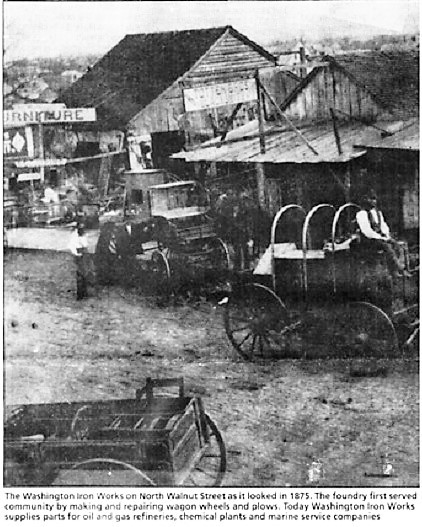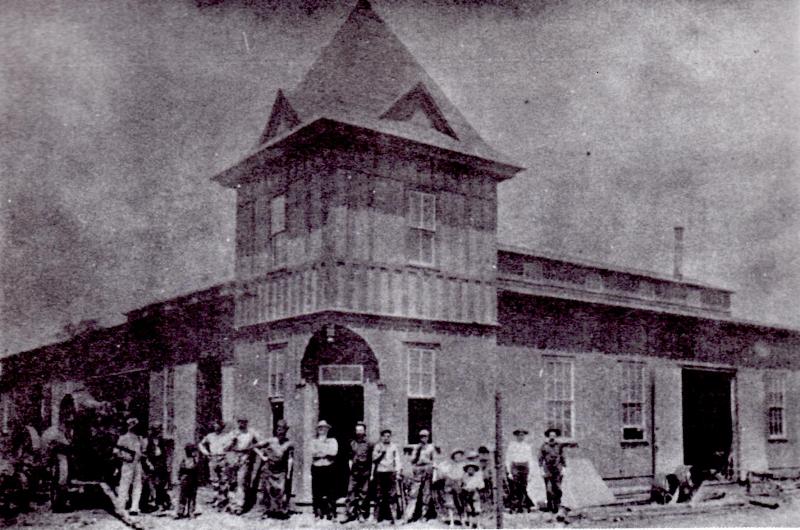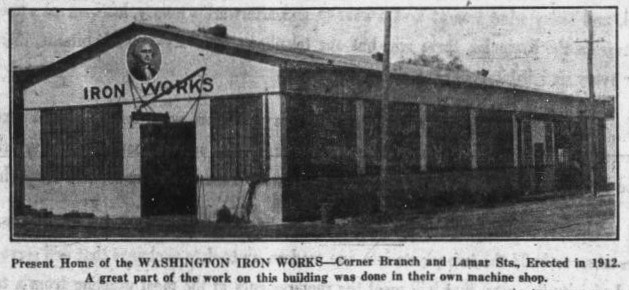 The Sherman Courier
Wednesday, August 15, 1917 pg. 19' FROM STAGECOACHES TO AUTOMOBILES Washington Iron Works is the oldest industry in Sherman, Texas. It has served the community from the days of the freight wagon and stage coach down to the present day of automobiles, interurbans and good roads. It is still owned and operated by descendants of the Totten family, the sixth generation being in charge of operations in 1998. Early in the stage coach days Sherman was the crossing of the east and west and north and south stage lines and was a place of importance. That fact perhaps is what induced Solon Totten, 27 years old, to locate in Sherman on May 1, 1876 from Quincy, Illinois. After several trips as a freighter from Jefferson to Henrietta, he and his brother, Levi Totten, settled in Sherman and worked at repairing and building freight wagons and stage coaches. Late in 1875 the entire Totten family - Joseph Totten and wife, Lovina and their 8 children - began the long overland journey to Texas. Solon and his bride, Ida, as well as his older brother, Levi, wife Mary and daughter Belle were among the group. Upon arrival in Sherman, Joseph Totten took up farming.  Solon and Levi Totten established the business in 1876 as Totten Brothers Blacksmiths. It was first located on East Cherry St., later moving to North Walnut St. First services included making and repairing heavy wagon wheels for stage companies, the repair of vehicles, and plows.  Totten Brothers Blacksmiths on North Walnut Street as it looked in 1875. The foundry first served the community by making and repairing wagon wheels and plows. Today Washington Iron Works supplies parts for oil and gas refineries, chemical plants and marine service companies.  The Washington Iron Works forged their own drills and lathe tools at that time but by 1917 they could buy them cheaper at $9 a pound. An expert machinist was paid $2 per day for a 10-hour day. The business grew steadily as the number of saw mills and gins increased along with the ever-growing population. Then the flour mills and oil mills appeared, calling for larger equipment and more room. The company was incorporated in 1881 and re-named Washington Iron Works, locating on North Walnut Street. The name change was due to Joseph Totten's, son of one of the founders, admiration of the first president of the United States. In the fall of 1887 Ola "Ollie" Totten accidentally shot herself while visiting in Oil Springs, Indian Territory. (Sherman Daily Register, Monday, September 12, 1887, pg.4) Her brother, Solon, left on September 1st to bring her home to Sherman because she was not doing well after physicians performed an unsuccessful operation to remove the "ball". (Sherman Daily Register, Thursday, September 1, 1887, pg.4) By the end of September she was recovering nicely as reported by the local newspaper. She married James A. Birdsong and died in 1902. She is buried in West Hill Cemetery along with her family. 1890  Since 1895, the industry has been located at 318 East Lamar. In
1894 the plant was moved to the corner of Branch and Lamar streets.
At the turn of the century Joseph sold his interest in the
business to his sons. In 1904 Levi Totten, due to failing health,
sold his interest in the business to his
brother, Solon, and his sons, Harry and Jesse, and moved to Paris,
Texas; he was killed in an automobile accident in Paris, Texas on
Saturday, May 22, 1915 and was buried in a Paris, Texas cemetery.
(Sherman Daily Democrat, Monday, May 24, 1915, pg. 1) The first electric lights in Texas were used in Sherman, and the dynamo was driven from the line shaft of the Washington Iron Works. They were also the first business to adopt the electric drive in their plant.  In 1912 a new steel and concrete building was erected around and over the old building without interrupting or interfering with the work going on in the machine shops. The plans and all details were worked out in their office; the building was fire proof; the steel work was cut and fabricated by the regular crew of The Washington Iron Works. The introduction of the diesel oil engine marked another epoch in the growth of the business. This type of engines were extremely heavy and required a finer quality of workmanship than the sawmill and gin engines. Harry Totten (1877 - 1964) became interested in diesel power when the engines were a rare item and gained expertise in the field. Again the Tottens stepped up to the change and maintained a high standard of work and quality. In 1917 each machine had its individual motor drive, the traveling crane requiring three; there were 42 electric motors used in the plant. The reputation of The Washington Iron Works as a diesel shop was known all over Texas and the Southwest, and difficult repair jobs were sent daily from all over Texas and other states. The Sherman Courier Wednesday, August 15, 1917 pg. 3 HERE AND THERE AMONG THE PEOPLE J.E. Thomason who has been employed at the Washington Iron Works is reported to have disappeared on August 5, since which time his family have had no word of him. He is said to be a sober man and a good workman. His wife is in needy circumstances and is unable to work and her only help is a fourteen year old boy. Mrs. Thomason says this is the third time he has been away in this manner and that his return is uncertain.  The company purchased the Lewis and Lavender Co. building and is now located at 400 E. Lamar. Prior to housing the Lewis and Lavender Co., it was the Everheart Grocery Co. Washington Iron Works sports car, 1920 Throughout
World War II Washington Iron Works employees worked around the clock
seven days a week, producing gun barrel molds for the U.S. Army.
The company was awarded the Army and Navy "E" for excellence in
its part in the war effort. The industry part of the business was discontinued after World War II with the machine shop becoming the core of the post-war business. In the late 1940s and early 1950s, they supplied parts and repairs for oil and gas refineries, chemical and petroleum plants and marine service companies throughout the world. Lost Sherman presented by Sherman Historical Museum, 1981, pg24 "The Totten Family", Herald Democrat, September 6, 1998  Historical Marker Sherman History Susan Hawkins © 2024 If you find any of Grayson CountyTXGenWeb links inoperable, please send me a message. |